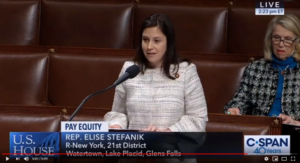
Women in America shouldn’t be paid less than men, U.S. Rep. Elise Stefanik (R-NY) said on Wednesday when she unveiled the WAGE Equity Act with 48 original cosponsors, all of them Republicans.
“The WAGE Equity Act is a prime example of Republicans leading on women’s empowerment and is a stark contrast to the Democrat’s legislation which prioritizes trial lawyers over employees and businesses,” said Rep. Stefanik, who sponsored H.R. 1935 on March 27.
The same day, U.S. House Democrats approved by a 242-187 vote the Paycheck Fairness Act, H.R. 7, which is their latest effort to ensure men and women in America are paid equally. Seven Republicans supported the measure, which also has been introduced in the U.S. Senate as the same-named S. 270.
Rep. Stefanik and her colleagues find fault with that legislation on a variety of fronts, she said on the House floor.
“I urge my Democrat colleagues to consider this legislation as a practical alternative that strengthens equal pay for equal work without the unnecessary frivolous lawsuits and burdens on businesses,” said Rep. Stefanik, who said she modeled H.R. 1935 on bipartisan legislation that Republican governors in Massachusetts, Vermont and Maryland have signed into law that focus on closing the wage gap.
U.S. Rep. Cathy McMorris Rodgers (R-WA), one of the 48 original cosponsors of H.R. 1935, echoed those sentiments saying the bill is “a better solution than the Democrat’s proposal,” which she said would require the federal government to collect data on people’s salaries and employment histories.
“A database like this, which would be run and maintained by faceless bureaucrats in Washington, D.C., is ripe for corruption,” Rep. McMorris Rodgers said.
In contrast, H.R. 1935 would encourage transparency rather than expanding “the size and scope of the federal government,” she added.
If enacted, H.R. 1935 would amend the Fair Labor Standards Act of 1938 to enhance provisions related to pay discrimination, according to the congressional record.
“Of the 2.8 million jobs created in the past year, 58 percent have gone to women,” Rep. Stefanik said. “Increasingly, women are their family’s primary breadwinners and we simply cannot ignore the fact that women are traditionally paid less than men.”
Among the 47 other original cosponsors who joined Rep. McMorris Rodgers in signing on to H.R. 1935 are U.S. Reps. Will Hurd (R-TX), Steve Stivers (R-OH), Fred Upton (R-MI), Susan Brooks (R-IN), Bill Huizenga (R-MI), John Katko (R-NY), Tom Cole (R-OK), Mike Turner (R-OH), Larry Bucshon (R-IN), Jackie Walorski (R-IN), Greg Walden (R-OR), Glenn ‘GT’ Thompson (R-PA), Bill Flores (R-TX), Tom Reed (R-NY), Paul Cook (R-CA), Mike Burgess (R-TX), Dave Joyce (R-OH), Bob Latta (R-OH), Adam Kinzinger (R-IL), and Darin LaHood (R-IL).
“I’ve always supported equal pay for equal work. In addition, gender discrimination is not only wrong, it’s illegal,” said Rep. McMorris Rodgers this week. “To close the pay gap and empower more women, people of color, and people with disabilities to be transformational leaders in our workforce, we need to make sure current laws work and are properly enforced. If they aren’t, these laws need to be updated.”
Rep. Stefanik released a summary of H.R. 1935 that said the bill would empower employees to utilize flexible work arrangements; create a “self-audit” system to proactively incentivize businesses to fix pay disparities; would protect individuals in negotiating employment based upon merit while offering the flexibility to voluntarily disclose prior salary history; would protect an employer’s ability to have a salary expectation conversation and allow the employer to act on salary history if it is voluntarily offered during the interview process; would protect employees in discussing their compensation with their colleagues while giving employers the right to set reasonable limitations on the time, location and manner of such activity; and would authorize a grant program for targeted negotiation education for women in college and career/tech programs, among other provisions.
The U.S. Chamber of Commerce has voiced support for H.R. 1935, which has been referred for consideration to the U.S. House Education and Labor Committee.



